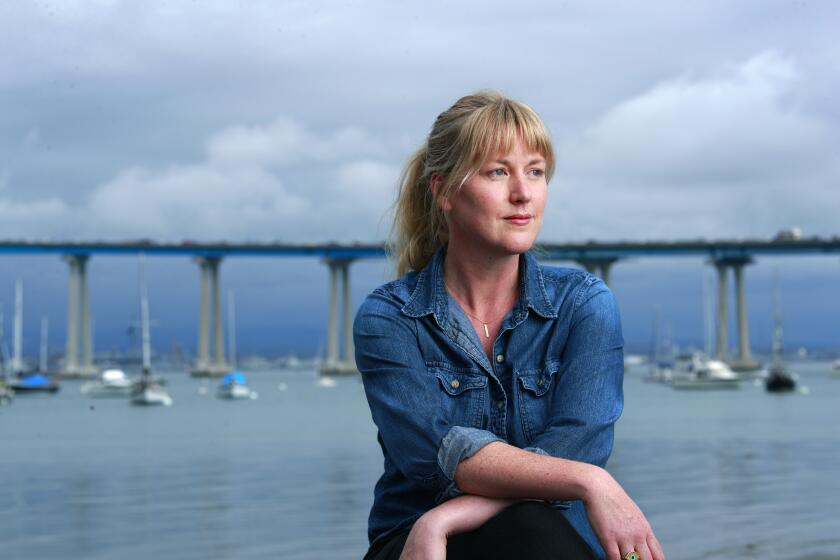Summer’s big thriller goes from LAX to JFK. Its author went from flight crew to Hollywood player
- Share via
On the Shelf
Falling
By T.J. Newman
Avid Reader: 304 pages, $28
If you buy books linked on our site, The Times may earn a commission from Bookshop.org, whose fees support independent bookstores.
T.J. Newman’s debut thriller is a nightmare come true for its pilot, Bill Hoffman. But for the author, it’s a publishing fairy tale come to life. The longtime flight attendant for Virgin America and Alaska Airlines wrote a thriller set on an airplane and sold it in a seven-figure, two-book deal. Then Universal grabbed the film rights for another seven figures, beating out Netflix and other big spenders.
“Falling” has been a dizzying ascent for Newman, 37, who once sold thrillers like her own at Changing Hands Bookstore in her native Phoenix. During the film rights auction, “I kept falling silent on the line with my agent,” she said. “He’d say, ‘OK, there’s a heated bidding war. We’re up to a million,’ and I’d say, ‘A million what?’ I didn’t get it. I’m not the kind of person who’s involved in a heated bidding war for anything.”
The frenzy for “Falling” is understandable: At every turn, Newman cranks the tension in unexpected ways that still satisfy the thriller lust. Her insider’s knowledge comes through in details that not only bolster the book’s credibility but also catalyze the plot. Though the book opens with a bloody foot landing in a passenger’s lap, Newman knows when to downshift to let in some compassion, a resource sorely needed in the air and on the ground.
“Falling” centers on an ultimatum forced on the pilot by hijackers: Either crash the full plane he’s flying from LAX to JFK or sacrifice his wife, son and baby. The idea first came to Newman on one of her red-eye shifts. Looking out on a sea of sleeping faces, she felt the weight of responsibility for their safe delivery.
With restrictions lifting everywhere, venturing out doesn’t mean abandoning your books. Ten summer reads to help you mark the return of beach season
Between the shocking twists, “Falling” manages to set the record straight on what flight attendants really do. They are trained in emergencies like “hazmat, heart attacks, hijackings … and all of it in a pressurized metal tube, thirty-eight thousand feet in the air going six hundred miles per hour. Five weeks of training and in only one of those days did they go over food, drinks, and hospitality.”
Though the majority of the action takes place in the air, Bill’s family lives in Playa Del Rey, once the locale of Newman’s crash pad, where she’d “day-sleep like a champ.” “Los Angeles was my home away from home,” she said during a video call from her apartment in Phoenix, which is sprinkled with airline memorabilia. She spoke with The Times about how failure, and flying, can prepare a person for takeoff.
You wrote the majority of “Falling” during overnight flights. Why is the dead of night on an airplane conducive to writing?
There’s something peaceful about a red-eye. It’s a sleepover with 150 strangers. It’s quiet and calm, and there are fewer medical emergencies or passenger issues. After I put everyone to bed and gave the pilots a break, I’d have the next four hours to myself. I’d sit alone in the galley, sipping coffee, and write my book. If I didn’t have my notebook, I’d write on the back of the manifest or a catering bill or a cocktail napkin. Whatever was handy. I always wonder how many lines or plot threads I lost because someone came around the curtain to ask for ginger ale.
You didn’t tell other flight attendants or many people in your life that you were working on a novel. Why not?
I was embarrassed. This was not my first attempt at pursuing something creative. After I got my BA in musical theater, I moved to New York and did the starving artist routine, trying to get parts on Broadway. It was nothing but complete and total abject failure.
The thing about failure, though — it toughens you up.
Absolutely. I wrote more than 30 drafts of this novel before I finally felt it was ready for an agent to see. I queried 41 different agents before I got my yes. I wouldn’t be where I am now if I hadn’t had that experience of extreme failure in New York.
What happened in the years between New York and getting to your yes?
I moved back in with my parents in Phoenix and started working at Changing Hands. It was the bookstore I grew up in and I loved it dearly. I’d always wanted to be a writer growing up. I’ve been a lifelong reader and writer, but I needed that safe place to express myself creatively. Writing in secret was liberating.
The upcoming political thriller “State of Terror” is Hillary Clinton’s “worst nightmare,” according to her co-author, Louise Penny.
The events of Sept. 11 loom large over “Falling.” Your mother was a flight attendant at that time; was she flying that day?
Not that day, but the thought that she could’ve been flying on one of those hijacked flights was very real. Everybody who works in the industry has some sort of connection to that day. It was personal and terrifying. And it changed everything for everyone.
“Falling” covers several characters, but it really belongs to the flight attendants, especially Jo. She’s the pulse of the book.
The three flight attendants are the only characters who didn’t change at all from Draft 1 to the final. They came into my head fully formed and unapologetically who they are. They are completely fictitious, but being surrounded by flight attendants every day fed my imagination. It’s a job that naturally attracts a larger-than-life personality. I got a lot of creative fulfillment out of it. I thought of it like this: Every flight is like a play or a book or a movie. There’s a beginning, middle and end; everyone’s in costume. There’s always going to be some sort of drama or conflict, and then you will have to work your way out of it. It’s a very theatrical experience.
Without giving anything away, the antagonists in this book are given back stories that could stir some degree of compassion in many readers. Why was that important to you?
I try to look at the world through as empathetic a lens as possible. As a flight attendant, it’s how we’re trained. If you’re getting pushback from a passenger, we’re trained to consider — before we react — if they had to spend an hour in security, or if they missed their first flight. Are they on their way to a funeral? Part of being a responsible member of society is trying to broaden your perspective. We’d all do better if we took that extra step in looking beyond ourselves and asking, “What’s it like for them?”
Bestselling novelist Maggie Shipstead had depicted elite worlds, but for “Great Circle,” a globe-spanning epic, she had to become a solo adventurer.
You have a two-book deal. Is the second one already in the works?
I’m working hard every day on the second book. The experience of trying to bring my first novel to publication while working on my second one is incomparable. I no longer have people interrupting me for ginger ales, but I’m still multitasking in this new incredible way. It’s a lot, but I’ve worked really hard to get to the point that I would be this overwhelmed. Any time I feel like I’m getting burned out, I just remind myself that I’m on an incredible journey.
More to Read
Sign up for our Book Club newsletter
Get the latest news, events and more from the Los Angeles Times Book Club, and help us get L.A. reading and talking.
You may occasionally receive promotional content from the Los Angeles Times.









